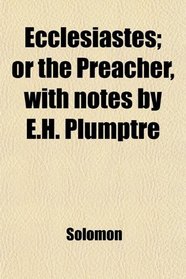Search -
Ecclesiastes; or the Preacher, with notes by E.H. Plumptre
Ecclesiastes or the Preacher with notes by EH Plumptre
Author:
Purchase of this book includes free trial access to www.million-books.com where you can read more than a million books for free. This is an OCR edition with typos. Excerpt from book: CHAPTER VII. ECCLESIASTES AND ITS PATRISTIC INTERPRETERS. It does not fall, as has been just said, within the plan of the present book, to give a review of... more »
Author:
Purchase of this book includes free trial access to www.million-books.com where you can read more than a million books for free. This is an OCR edition with typos. Excerpt from book: CHAPTER VII. ECCLESIASTES AND ITS PATRISTIC INTERPRETERS. It does not fall, as has been just said, within the plan of the present book, to give a review of... more »
ISBN-13: 9780217203470
ISBN-10: 0217203477
Publication Date: 8/9/2009
Pages: 248
Rating: ?
ISBN-10: 0217203477
Publication Date: 8/9/2009
Pages: 248
Rating: ?
0 stars, based on 0 rating




